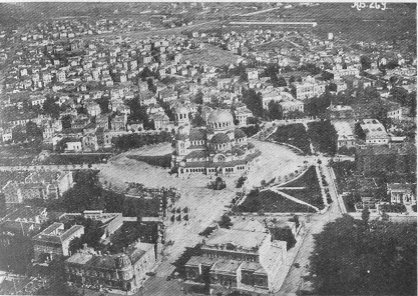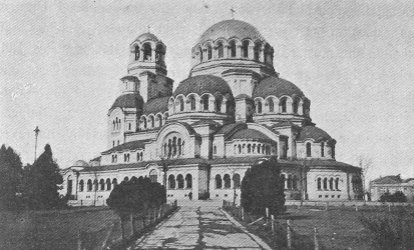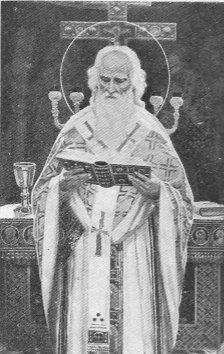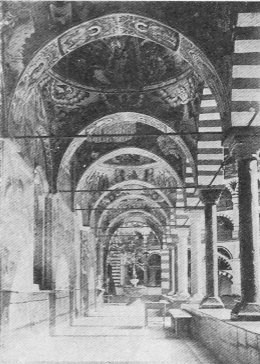Meet Bulgaria,
R.H. Markham
CHAPTER X
Getting wise
A.
During the first two decades of the present century Bulgaria had far
more schools in proportion to the number of her inhabitants than any other
Balkan country. After the World War, which brought Jugoslavia and the Greater
Rumania into being, both those states began to open new schools with extraordinary
rapidity, making it possible for most of their young subjects to learn
to read and write. Yet in spite of this most commendable improvement effected
by her neighbors Bulgaria still leads the Balkans in the proportionate
number of children under instruction. In every town and larger Bulgarian
village there is a school; it is usually housed in a first class, modern
building and in most cases conducted by fairly competent teachers. The
tiny mountain settlements, made up of a few huts or of widely scattered
cabins, are without schools of their own, but most of them are within walking
distance of others, situated at convenient points, so that practically
every child in the country 1s able to get an elementary education. As a
matter of fact 90% of the children in Bulgaria of primary school age are
actually studying.
There are in all 6,850 primary schools, including kindergartens, 103
secondary, two normal and scores of professional schools of various sorts
and grades. There is also an excellent modern University with seven branches
or faculties, a state Conservatory of Music and an Art Academy. There are
3,780 university students of which 72% are men and 28% women. The largest
number are enrolled in the law department and after that come literature,
history and philosophy. 22,271 teachers— 10,914 men and 11,357 women —
give training and instruction to the 723,205 children in the primary schools.
For the 20,750 boys and 13,976 girls in the high schools there are 1,781
teachers — 915 men and 866 women. There are 305 professors in the university
of which only two are women. This educational system, ministering daily
to a seventh of the people in the country and using nearly 24,000 specially
trained employees is the largest enterprise of any kind in Bulgaria.

Sofia is the cultural center of Bulgaria and this church
is the cultural center of Sofia. About it are grouped the University, Academy
of Science, Musical Conservatory, Art Academy, Holy Synod, a large high
school, the state printing plant, the National Assembly and the Ethnological
Museum
And its creation is one of the finest achievements of the Bulgarian
people. For it must be remembered that a hundred years ago there was not
a single first class Bulgarian school in existence. The first secular book
to appear in the Bulgarian language came into being at the time of the
American Revolutionary War. It was written by hand and distributed, largely
surreptitiously, among a few enlightened people who had to copy it from
manuscript by hand. In 1806 appeared the first printed book in Bulgaria,
a collection of sermons prepared by the Bishop of Vratsa, who was then
in exile in Bucharest. Twenty years later, or approximately a hundred years
ago, the first text book in the Bulgarian language appeared, a rather simple
primer with a number of excellent observations on methods of teaching.
This does not mean that before that there were no schools whatsoever
in the country. There were, indeed, scores but they were of a very primitive
nature, largely unadapted to the needs of the people and taught by untrained
monks with a limited outlook and completely antiquated methods. They were
"cell-schools" located at various monasteries or in churches and most of
the instruction they furnished was of a religious or ritualistic nature.
The pupils sat in bare, drab rooms and spent much of their time in learning
formal exercises by heart. In these "cultural hearths" the Bulgarian fire
smouldered but weakly yet they deserve the gratitude of the people for
preserving the sparks of a national consciousness at a time when all the
Bulgarians were in political bondage to the Turks and in spiritual bondage
to the Greeks.
Naturally an awakening people craved better schools, a few of which
they received from two different sources. First, a number of good Greek
ones were opened in various places in the country and later several excellent,
aggressively nationalistic Bulgarian schools were founded. The best known
of the latter was the High School at Gabrovo, in central Bulgaria, founded
in 1835 by Vasil E. Apriloff, a rich Bulgarian merchant living in Russia;
it was long maintained by him and his fellow patriots and played a notable
role in Bulgaria's awakening. It was followed by many other private and
communal enterprises of a similar nature.
Their appearance showed that the nation was being aroused from a half
millennial sleep. But progress was difficult, .for most of the Bulgarians
were peasants — very poor and backward, ignorant, timid and cowed, sharing
their wretched huts with domestic animals and completely shut off from
the outside world. Centuries of persecution, frustration and oppression
had constricted their souls, robbed them of hope and initiative and covered
them with such a dense apathy that they passed among their neighbors as
a dull and lifeless mass. Besides these villagers there were also artisans
and small retail merchants living in dreary, meager, more or less isolated
towns and travelling from place to place in the Turkish Empire to sell
their wares. And finally there were a few big Bulgarian merchants with
a knowledge of the outside world, although at that time most of the great
merchants in Turkey were Greeks.
Greece at that time set the fashion in the realm of culture, social
intercourse and business success, as far as the Near East was concerned.
Every Bulgarian merchant of any standing spoke Greek well and many of the
more cultured and better informed Bulgarians got all their knowledge of
the outside world through Greek channels.
In addition to this the Greeks had an absolutely unexcelled literature
and art while the Bulgarians had nothing. The Bulgarians were practically
without literature or culture, their language was reputed to be uncouth
and they were held in derision by all their more polished neighbors. It
seemed to the other Balkan peoples a joke to talk of the creation of a
Bulgarian culture. Even to many sincere well wishers of Bulgaria it appeared
preposterous to attempt to supplant classic Greek schools with those of
a nation of obscure Shepherds and clodhoppers. In the Bulgarian language
at that time "Bulgarian" was practically synonymous with villager or country
"jake" while the word "Greek" meant a man from the city. It was not easy
for these poor shoemakers and sellers of cheese and sheepskins to open
up "clodhopper" schools. And when they got them open it was still harder
to find teachers for them and to supply them with even the most elementary
text books. The wise laughed at these culture-spreading tailors; most of
the wealthy opposed them and the officials persecuted them, yet one new
school after another appeared, to kindle the fire of enlightenment, nationalism
and revolt among the youth. So great was the Bulgarians' desire for education
that by the time they were freed from Turkey they had nearly 1,500 schools
of which almost a score were of secondary rank, two being Junior Colleges.
After the War of Liberation the number of schools grew very rapidly
and, though for many years rather inefficiently conducted, they succeeded
in supplying one of Bulgaria's main needs, namely that of a set of state,
country and municipal administrators. The higher officials were trained
in Russia, France and Germany, but most of the clerks, assessors, teachers,
surveyors, inspectors, judges, prosecutors and other members of the new
state administration had to get their preparation at home and it was the
new schools that gave it to them. In addition, Bulgaria had to have an
intelligentsia: men to write books, publish papers, lead the political
parties, bring in the culture of the western world and guide a nation of
villagers along the path of progress, Bulgaria was the most submerged and
isolated nation in Europe, with no aristocracy and with practically no
middle class so she was in dire need of educated people to enlighten her.
These the rather primitive and insufficiently equipped schools attempted
to supply.
If one should go to the trouble of looking over the inspectors' reports
of those early days he would be distressed to learn how extremely simple
these first educational institutions were; he would be appalled at the
lack of discipline, the wretchedness of the buidlings and the ignorance
of the masters. Furthermore, if he should undertake to criticise the Bulgarian
intelligentsia, basing his strictures only on the estimates the Bulgarians
have written of themselves, if he should dwell upon the paralyzing beaurocratism
and the stifling red tape of the Bulgarian administration and if he should
be caught within the wheels of the state machinery often clumsily handled
by dull and heartless officials he might be inclined to think that the
Bulgarian schools have not done a very good job. Such simple things as
getting out a passport in Bulgaria or as entering and leaving the country
are accompanied by so many very tedious formalities, so much waiting and
the loss of so much time that the victim of these impositions is apt to
think the officials encumber the tax payers rather than facilitate them;
while, in addition, there has certainly been a tragic and disastrous estrangement
between the intelligentsia and the common people. The schools appear to
have prepared graduates to serve themselves at the expense of the masses
rather than apostles to devote themselves to the uplift of the masses.

Alexander Nevsky, Sofia, the, finest cathedral in the
Balkan Peninsula
Yet such a pessimistic estimate would be entirely unfair. One must bear
in mind the huge task which newly created Bulgaria had before her. At one
step she had to pass from the middle ages to modern times. She had suddenly
to discard the degrading traditions of Turkish anarchy and corruption in
favor of the effective methods of constitutional democracy. She had to
exchange pack horses for railroad trains and sheepskin caps for stove pipe
hats. And in this furious flight out of oriental darkness into civilization
there was no dominating tradition and no steadying aristocracy. Tradition
and authority were disregarded, and as in a gold rush, all the ambitious
people plunged forward so as to be at the head of the procession. Naturally
there was a vast amount of brutal shoving, many strident voices, intrigues
and shady combinations. The pictures which such Bulgarian authors as Aleko
Constantinoff, Stoyan Mihailovsky, S. L. Kostoff and Anton Strashimiroff
draw of the new Bulgarian intelligentsia struggling for places of power,
over-proud of its own scant culture and too strenuously endeavoring to
replace the peasant bagpipe and shepherd's flute with the lyre and harp
of classical culture are very sombre. But the fact remains that, although
the most recently created of all the Balkan states, Bulgaria has been one
of the best governed, if not the best, and that she has created in a remarkably
short time out of nothing a very creditable literature, an excellent theater,
a very good opera, a wholesome, well informed press, and an appreciably
improved standard of living. During these years not a few public men of
the type of the ancient Roman, Cincinnatus, have given their lives and
services to Bulgaria and there is no land in the Balkans freer from venality
and the baser forms of corruption. Facing the stupendous task of creating
competent and enlightened leadership for the newly emancipated nation of
peasants, suddenly determined to govern themselves along most democratic
lines, the poorly equipped and at first indifferently conducted Bulgarian
schools did not fail.
However, more than a decade ago it became plain to many observers that
although constantly improving in their technique the schools were not doing
all that they should for the nation. They were turning out graduates unfitted
to cope with life in Bulgaria. They were still creating officials for a
state already badly overstocked with officials. They were manufacturing
bureaucrats for a people already pressed by the. weight of bureaucracy.
So efforts have been made to bring about fundamental changes. This new
tendency in Bulgarian education is not due to any one group, party or individual,
but rather to the sound, practical instincts of all the thoughtful people
in the country, yet a person deserving mention as making a special contribution
to school reform is Stoyan Omarchevsky who was Minister of Education during
the time that the Agrarian League was in power, under the premiership of
the villager, Alexander Stamboliisky. Mr. Omarchevsky was for many years
a provincial school teacher and his close contact with the backward common
people, added to his wide reading, his alert disposition and his determination
to make the school system better serve the peasants, of whose party he
was one of the leaders, more than compensated for his lack of formal pedagogical
erudition and kept him close to reality. One of the chief changes he introduced
into the educational system was the lengthening of the period of compulsory
instruction from four to seven years. His aim was eventually to change
the direction of the whole educational enterprise making much of it more
practical and better fitted to teach the Bulgarian youth how to live and
work in towns and villages. He wanted the schools not to continue to turn
out state officials, lawyers and other professional men of whom the country
already had more than it could create jobs for, but to train boys and girls
how to get more wealth from Bulgarian fields, mines, forests and factories.
Dr. William E. Russell, of New York, once Associate Director of the
International Institute of Teachers' College, visited Bulgaria at the time
Mr. Omarchevsky was in office and after making a very careful study of
the Bulgarian schools wrote a book on them, entitled "Schools in Bulgaria"
in which he said among other things:
"The most interesting feature of education in Bulgaria is
the adjustment of an entire educational system to a national end. This
is the lesson that America needs to learn. There is a process of education
and a purpose of education. Here is where Bulgaria has made her contribution.
So far as the process is concerned, the American student will find relatively
little of interest. But he will be compelled to bow in admiration before
Bulgaria when it comes to finding an explanation of what it is all about".
However the educational ideals of the more progressive Bulgarians
could not be realized at once. The overproduction of a white collared intelligentsia,
frantically seeking sitting down state jobs, is not a specifically Bulgarian
deficiency. It exists in most European countries and especially in the
newer states, creating a terrible crisis almost as acute as the present
general political and economic crisis. Because of the extreme seriousness
of this problem and its very deep seated causes it could not be solved
easily nor quickly. Bulgaria is still grappling with it, persistently endeavoring
to turn the stream of her school graduates away from state clerkships into
the channels of productive private enterprises.
One method she has adopted for bringing this about is the raising of
the entrance requirements for the higher schools. She is constricting the
little end of the funnel through which the diplomaed youth flow out into
"life", meaning clerkships. A few higher schools have been closed and from
now on there will be a somewhat more rigorous process of natural selection
of pupils. The aim is of course not to make the principle of selection
wealth or social standing but native ability. From now on it is not going
to be as easy to get a college education in Bulgaria as formerly. This
apparent restricting of opportunity seems to some people undemocratic and
youth who are shut out of the higher schools because of low grades appear
to be stranded at the cross roads. But the measure is undoubtedly a wise
one, for the energy of such young people must be turned into different
channels.
Of course in this case the supreme need is to produce the new channels
and that is not easy. It is far more simple to close schools that are turning
out too many intellectuals than to open new schools capable of preparing
the Bulgarians to produce wealth and happiness in 5,000 little villages
surrounded by small and scattered fields. The young people cannot become
doctors, for already many doctors are without patients. There are far too
many lawyers. There is not enough capital nor industry to give employment
to many more engineers and architects. Business, commerce and the banks
are already over supplied with clerks and accountants. So what shall a
Bulgarian youth prepare to be and do? Go back to the farm! But it consists
of twelve acres scattered among seventeen fields so there is not much opportunity
for a college graduate to satisfy his ambitions there. It is plainly a
very difficult problem, requiring patience, devotion and much heroism.
Bulgarian villages and agriculture will slowly have to be made over. And
it is to that end that Bulgarian pedagogues and statesmen are bending their
energies.
* * *
One means for bringing this about is the recent building of the best
agricultural college in the Balkans. It is part of the State University
at Sofia and is housed in a magnificent new building for the construction
and equipment of which the American Rockerfeller Foundation contributed
115,000 dollars. The first of its twofold purposes is to carry on extensive
and expert research in order to find out exactly what methods will best
enable Bulgarian peasants to get the largest possible returns from their
fields, gardens and forests. The institution is equipped with excellent
laboratories which facilitate a number of gifted scientists in investigating
all the chief problems connected with Bulgarian soil, plant pests, animal
diseases, stock improvement, seed selection and more productive cultures.
The second aim of Bulgaria's agricultural faculty is to train expert farm
agents, both men and women, to live in the villages among the peasants
and by instruction and example show the villagers how to live better and
work more efficiently. These agents form part of a whole network of peasant
helpers of which the ganglia are agricultural "kathedras" or chairs located
in the chief agricultural centers in Bulgaria.
Yet this is, of course, the smallest part of the task of Bulgarian schools,
because after all these "experts" are state employees, with state or county
jobs, — still parts of the heavy bureaucracy, though in many ways most
useful parts. What the state chiefly needs is not to train farm agents
but to prepare the youth to work for themselves on their own land. The
aim is to tie the schools up to the land, to abolish the legend that a
diploma means an easy, more or less unproductive, routine state job. To
bring this about there are a number of lower agricultural schools for boys
and girls. Here are received only peasant children who are prepared exclusively
to return to their villages. A number of these girls' schools are among
the most inspiring institutions in all the Balkans. They take girls out
of the mud of a village and off of the floor of a peasant house but do
not separate them from their hens and pigs and bees. They do not teach
the girls to waltz and tango nor spoil them with longings to get into the
“high society” of the cities but show them how to make life in the villages,
even among the cows and pigs, fairly pleasant and even cultured. The girls
milk the cows and take care of the farm animals, they have a model dairy,
keep records of all the chickens, look after the bees, tend the vineyards
and make the wine; they learn to sew, to cook wholesome tasty food, to
preserve fruit and vegetables and to care for light sicknesses; they sleep
in beds, sing native songs, play native games and enjoy two or three happy
years, after which they go back to the village house. 1 hey soon marry
and spend the rest of their lives in trying to induce obstinate mothers-in-law
and fathers-in-law and rather domineering husbands to accept a few of the
newer, better methods. It is, of course, not an easy undertaking and seldom
do these girls succeed in introducing into their village homes many of
the beautiful things they learned in school, yet they make some progress,
helping Bulgaria to advance.

Painting by Anton Mitoff
Saint Clement of Ochrida, who lived in the ninth and
tenth centuries and was one of the most distinguished of Bulgaria's ancient
enlighteners. He was the pupil of two still more famous Bulgarian brothers,
Cyrit and Methodius, who created the Slavic alphabet and originated a large
school of gifted and indefatigable missionaries and teachers At that epoch
Bulgarian culture was almost exclusively ecclesiastical

A cloister in Rilo Monastery. The interior walls and
ceilings of all Orthodox churches are covered with paintings representing
Biblical scenes. Many of them are beautiful and inspiring
* * *
Still more useful than these schools, because they reach a far larger
number of youth, are the 100 pro-gymnasium extension courses, located in
the larger villages. They are attended by boys and girls who have finished
their seventh and last year of compulsory education and are devoted entirely
to practical training and instruction in agriculture and domestic science.
They keep the youth in direct touch with peasant life and deal particularly
with the specific problems in the villages in which they are situated.
Each year exhibitions of the work of the pupils are given and every effort
is made to arouse an interest and to generate pride in efficient agriculture.
[Previous] [Next]
[Back to Index]



